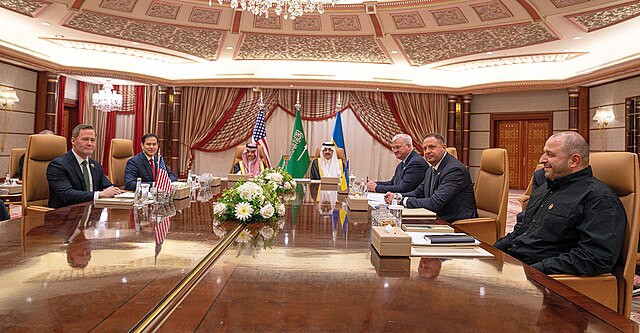Senior U.S. and Ukrainian officials met in Jeddah, Saudi Arabia, on Tuesday in the first high-level discussions between the two nations since a contentious Oval Office meeting between President Donald Trump and Ukrainian President Volodymyr Zelenskyy in February. The talks come as the U.S. has cut military aid and intelligence-sharing with Kyiv, increasing pressure on Ukraine to consider concessions for a potential peace agreement with Russia.
Leading the U.S. delegation is Secretary of State Marco Rubio, joined by National Security Advisor Mike Waltz and special envoy Steve Witkoff. On the Ukrainian side, Zelenskyy's Chief of Staff Andriy Yermak is heading negotiations alongside Ukraine's defense and foreign ministers. Notably absent is President Zelenskyy himself, though he met with Saudi Crown Prince Mohammed bin Salman in Riyadh a day earlier.
"The important point in this meeting is to establish clearly their [Ukraine's] intentions, their desire, as they've said publicly now numerous times, to reach a point where peace is possible," Rubio told reporters ahead of the talks. He added, "We have to understand the Ukrainian position and just have a general idea of what concessions they'd be willing to make because you're not going to get a ceasefire and an end to this war unless both sides make concessions."
The discussions take place against a backdrop of intensifying battlefield pressure on Ukraine. Just hours before the meeting, Ukraine launched its largest drone strike on Moscow to date, reportedly deploying at least 91 drones. Russian officials claimed three people were killed, and 337 drones were shot down across Russian territory. The attack was widely seen as an attempt by Kyiv to demonstrate its continued military capability amid concerns that it may be forced to negotiate from a position of weakness.
At the center of the U.S.-Ukraine talks is a ceasefire proposal reportedly being considered by Kyiv. The proposal would halt aerial and naval attacks while allowing ground combat to continue, a move intended to test Moscow's willingness to negotiate an end to the war. "Ukraine's position in these talks will be fully constructive," Zelenskyy said in a statement on X, formerly Twitter. Yermak echoed the sentiment, stating, "The team is onsite. Getting ready to work. Protecting Ukrainian interests, a clear vision of ending the war, we will work effectively with our American partners."
The high-stakes negotiations follow a period of strained relations between Washington and Kyiv. A diplomatic rift erupted in late February when Zelenskyy clashed with Trump and Vice President JD Vance during a heated White House meeting. The fallout resulted in the U.S. halting critical military assistance to Ukraine, further complicating Kyiv's position on the battlefield.
European allies are closely monitoring the talks, concerned about Washington's shifting stance on the war. British Prime Minister Keir Starmer has urged the U.S. to restore military aid, while Polish Prime Minister Donald Tusk issued a plea on social media: "Dear Americans, dear Ukrainians, don't waste this chance. The whole world is watching you in Jeddah today. Good luck!"
The Biden administration had maintained steadfast support for Ukraine, but under Trump, the U.S. has pivoted toward exploring direct negotiations with Russia. Last month, U.S. and Russian officials met in Riyadh without Ukrainian or European participation. That meeting heightened fears in Kyiv that Washington may pressure Ukraine into making territorial concessions as part of a broader peace agreement.
Rubio has hinted at this possibility, stating that Ukraine may struggle to reclaim all of its lost territory. "Once you understand where both sides truly are, it gives you a sense of how big the divide is and how hard it's going to be," he said. Russia currently controls about 20% of Ukraine, including Crimea, which it annexed in 2014, and key parts of the Donetsk region in the east.
Another key issue expected to be discussed is a U.S.-Ukraine critical minerals deal that was left unsigned after the Oval Office dispute in February. Trump has framed the agreement as a necessary component of continued U.S. support, linking it to compensation for the billions of dollars Washington has already provided in military aid.
Trump's special envoy, Steve Witkoff, who has taken a central role in Ukraine diplomacy, expressed optimism that the minerals deal would be finalized soon. He also revealed plans to visit Moscow for discussions with Russian President Vladimir Putin, a move that underscores the U.S.'s willingness to engage with Russia directly.
Ukraine's European partners have voiced strong opposition to any forced concessions, arguing that Kyiv should negotiate from a position of strength. Zelenskyy has also warned that Russian President Vladimir Putin does not genuinely seek peace and has broader ambitions that could threaten other European nations if Ukraine falls.




